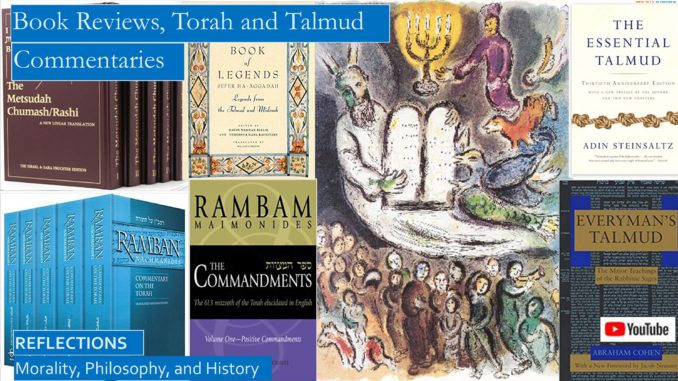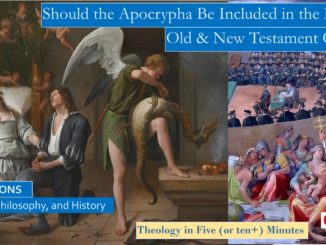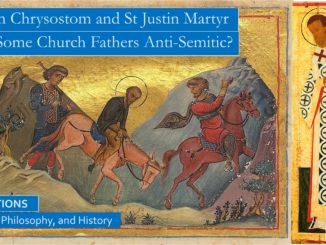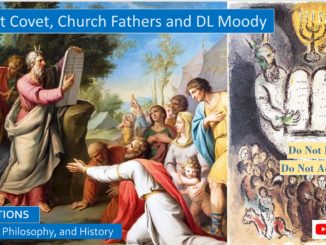
These quick book reviews include links to our YouTube videos and blogs on the commentaries on the Torah and the Talmud. The Torah, which in Hebrew means Law, is the first five books of the Old Testament which are the most treasured part of the Scriptures for Jews, on the Sabbath Jews read a portion of the Torah so all five books are read during the course of the year’s services. The Talmud is commentary on the Laws of Judaism, the Babylonian Talmud is more extensive than the Jerusalem Talmud, and can fill several shelves of a bookcase. Since much of this commentary is on the dietary laws and Jewish festival observance, we will consult summaries of the Talmud on the moral and ethical laws of the Torah.
We encourage Christians to study the moral lessons of the Torah, we do not hold to the dual-covenant belief that the laws in the Torah have been superseded. St Irenaeus in his influential work, On Heresies, teaches us that the moral laws of the Torah are still binding on Christians, and that the dietary and festival laws that have been superseded can be read as teaching moral lessons allegorically.
YouTube video for this blog: https://youtu.be/mvstpk88TxI
YouTube Script for this video with book links: https://www.slideshare.net/BruceStrom1/book-reviews-commentaries-of-torah-and-talmud-medieval-rabbis-and-modern-rabbis-and-scholars
LEADING MEDIEVAL RABBINICAL COMMENTARIES ON THE TORAH
Who are the medieval Rabbinical commentators on the Torah?
Metsudah Chumash 5 Vol Set Hardcover, Torah with Rashi commentary and footnotes, by Rabbi Avraham Davis (purchasing individual volumes is not practical)
The earliest is Rashi, a medieval French rabbi from the eleventh century. Rashi was famous both for his commentary on the Talmud and on the Tanakh, particularly the first five books of the Old Testament known to Jews as the Torah or Chumash: Genesis, Exodus, Leviticus, Numbers and Deuteronomy.
These volumes also include valuable commentary on Rashi’s commentary.
Maimonides, or Rambam: The Commandments (Sefer Ha-Mitzvoth) The 613 Mitzvoth of the Torah elucidated in English (2 vol.), Charles B. Chavel (Translator)
Rambam, or Maimonides, a medieval Sephardic Jewish philosopher, was born in Cordoba, Spain, and lived for most of his life in Egypt. We will be studying his summary of 613 commandments drawn from the Torah, 248 You Shall positive commandments and 365 negative You Shall Not commandments. His summarization of the Talmud in his fourteen volume Mishneh Torah, which is a semi-canonical status among Jews to the present. The Talmud is a sprawling commentary on Jewish life, examining both the moral teachings of the Torah plus rabbinical discussions on following the dietary laws and how to observe the many religious holidays.
You can access much of Rambam’s work, in particular the Mishne Torah, and also the Rashi commentary, on the Chabad website: www.chabad.org
Ramban: Commentary on the Torah – 5 Volume Set, by Rabbi Moshe ben Nachman, Rabbi Charles Chavel (Translator)
Ramban, or Nachmanides, was a Sephardic rabbi and philosopher also born in Spain, emigrating to Jerusalem after the First Crusade. He was known both for his commentary on the Torah, which we will consult, and for his writings on the Kabbalah, or mystical writings on the Torah.
MODERN SELECTIONS FROM TALMUD, AND COMMENTARIES ON THE TORAH AND TALMUD
The Book of Legends/Sefer Ha-Aggadah: Legends from the Talmud and Midrash
The Book of Legends, originally published in Hebrew in 1911 is absolutely marvelous, with many moral teachings drawn from the Talmud and the Midrash, with a complete index.
613 Mitzvot: A Contemporary Guide to the Commandments of Judaism, by Ronald L. Eisenberg
Dr Eisenberg is like a modern day Rambam, he is a radiologist, non-practicing attorney, and a Jewish scholar and author. His explanations of the 613 Mitzvah are elegant and concise.
Commentary on the Torah Paperback, by Richard Elliott Friedman
We did learn from this commentary, but it is no improvement on the classical commentaries, and we demurred on some of his modern perspectives.
The Essential Talmud Paperback, by Adin Steinsaltz
This summary has been in print for thirty years, and starts with a history of the Talmud, plus summaries of its main moral teachings.
The Talmud: A Selection (Penguin Classics), by Norman Solomon (Translator, Introduction, Commentary)
This 800+ page volume has selections from the Talmud arranged in the order of the actual tractates. The introduction discuss how to study the Talmud.
Everyman’s Talmud: The Major Teachings of the Rabbinic Sages, by Abraham Cohen
This revered collection is organized by topic, such as sections on the Moral Life, Domestic Life, and Social Life, plus sections on topics like Jurisprudence, Nature of God, and many other sections.
The Bedside Torah : Wisdom, Visions, and Dreams, by Bradley Shavit Shavit Artson
As the title suggests, this author prefers to retell both classical moral stories from Jewish sources, plus stories of his own on the Torah.
The Torah Revealed: Talmudic Masters Unveil the Secrets of the Bible, by Avraham Yaakov Finkel
This is a selection of stories from the Torah itself, in the order of the five books in which the stories and teachings appear.
RABBI TELUSHKIN COMMENTARIES ON MORAL TEACHINGS OF TORAH AND TAMUD
Biblical Literacy: The Most Important People, Events, and Ideas of the Hebrew Bible, by Joseph Telushkin
This is a selection of stories from the Torah itself, in the order of the five books in which the stories and teachings appear.
Hillel: If Not Now, When?, by Rabbi Joseph Telushkin
This is our YouTube video on Hillel, using his book:
Comparing Hillel and Shammai to Jesus
https://youtu.be/ygxn2qqGnOI
And our blogs on this topic:
http://www.seekingvirtueandwisdom.com/hillel-and-jesus-reflections/
http://www.seekingvirtueandwisdom.com/comparing-hillel-and-shammai-to-jesus/
http://www.seekingvirtueandwisdom.com/more-stories-and-sayings-of-hillel-and-shammai/
Jewish Wisdom: Ethical, Spiritual, and Historical Lessons from the Great Works and Thinkers, by Joseph Telushkin
Our rabbi reviews each book of the Old Testament, but not the Deutero-Canonical books, and briefly discusses the 613 Mitzvah.
The Ten Commandments of Character: Essential Advice for Living an Honorable, Ethical, Honest Life, by Joseph Rabbi Telushkin
We ordered the Ten Commandments of Character while writing this review, the question of character is interesting, we can compare the kingships of Saul and David. David may have even sinned more than Saul, but David had greater character, or so you could argue. These additional so-called commandments do not neatly map onto the Decalogue, we look forward to pondering the issue of character when reading this book.
A Code of Jewish Ethics: Volume 1: You Shall Be Holy, by Rabbi Joseph Telushkin
A Code of Jewish Ethics: Volume 2: Love Your Neighbor as Yourself, by Rabbi Joseph Telushkin (Author)
When we were perusing our library, we discovered we had purchased many books written by Rabbi Telushkin over the years. The Jewish section at the bookstore is dominated by Jewish Culture and Cuisine and the Holocaust, with few books on how to live a godly life, but for Rabbi Joseph Telushkin, morals and ethics are all he wants to write about.
These are his latest books, and the table of contents and sample pages in Amazon are interesting, but the second volume are not organized by the individual commandments in the Decalogue as I anticipated. The printed Volume 2 is pricey, so we will purchase the Kindle edition.




1 Trackback / Pingback